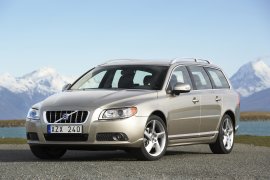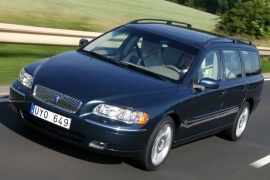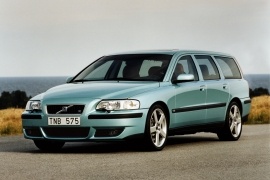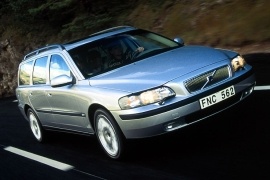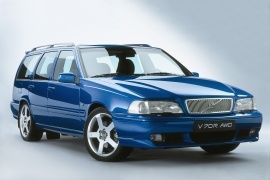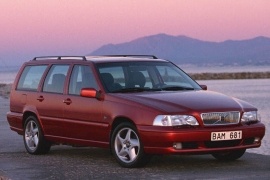VOLVO V70 Models/Series Timeline, Specifications & Photos
First production year: 1997
Engines: Diesel, Ethanol, Gasoline, Natural gas
Body style: Wagon (station wagon, estate, combi, touring)
Volvo was under full Ford ownership in 2007 when it introduced the third generation of the V70 in February, and it continued the long line of Swedish brand station wagons.
Despite being marketed as an estate car for the S60 lineup, the 2007 V70 was actually more related to the brand's flagship, the S80. They shared the same P3 platform, while the S60 was based on the previous P2 chassis.
This generation marked a clear departure from the angular shapes of its predecessor, and there was almost no flat surface on the entire car. Not even the roof, which was slightly curved and sloped down towards the tailgate. The blacked-out B- and C-pillars reminded of the C30 compact hatchback, while at the back, the tall and high-mounted taillights followed the same idea from the older 850 Station Wagon.
Inside, the carmaker showed its skills and provided a unique design language. It followed the minimalist trend for the most part of the dashboard. The only panel covered with buttons was the center stack, where Volvo insisted on having a unique design for the air-flow buttons, shaped like a seated passenger. Apart from the two occupants on the front bucket seats, the V70 was able to carry three more adults passengers in the back without making them feel cramped. The split-folding (40:20:40) rear bench expanded the trunk from 815 liters (28.8 cu-ft) up to 1,600 liters (56.5 cu-ft), with the seats down.
Under the hood, Volvo installed a wide choice of engines ranging from 118 hp to 304 hp. Depending on the options, the power went to the front or to all wheels.
VOLVO V70 1.6L D2 FWD 6AT (115 HP)
VOLVO V70 1.6L D2 FWD 6MT (115 HP)
VOLVO V70 2.0L D FWD 6MT (136 HP)
VOLVO V70 2.0L D3 FWD 6AT (136 HP)
VOLVO V70 2.0L D3 FWD 6MT (136 HP)
VOLVO V70 2.0L D4 6AT FWD (181 HP)
VOLVO V70 2.0L D4 6MT FWD (181 HP)
VOLVO V70 2.0L D4 AWD 6AT (163 HP)
VOLVO V70 2.0L D4 FWD 6AT (163 HP)
VOLVO V70 2.0L D4 FWD 6MT (163 HP)
VOLVO V70 2.4L D FWD 6AT (163 HP)
VOLVO V70 2.4L D FWD 6MT (163 HP)
VOLVO V70 2.4L D4 6AT AWD (181 HP)
VOLVO V70 2.4L D5 AWD 6AT (215 HP)
VOLVO V70 2.4L D5 FWD 6AT (215 HP)
VOLVO V70 1.6L T4 FWD 6AT (180 HP)
VOLVO V70 1.6L T4 FWD 6MT (180 HP)
VOLVO V70 2.0L FWD 6MT (145 HP)
VOLVO V70 2.0L T5 6AT (245 HP)
VOLVO V70 2.0L T5 FWD 6AT (240 HP)
VOLVO V70 2.0L T5 FWD 6MT (240 HP)
VOLVO V70 2.5L T FWD 6AT (200 HP)
VOLVO V70 2.5L T FWD 6MT (200 HP)
VOLVO V70 3.0 T6 AWD AT (304 HP)
VOLVO V70 3.0L T6 6AT AWD (304 HP)
VOLVO V70 3.0L T6 6ATAWD (285 HP)
VOLVO V70 3.2L 6AT AWD (243 HP)
The refreshed version of the V70 brings lots of subtle changes. The most noticeable changes brought to the exterior design are the grille and the bumpers. The car has new 17-inch alloys, clear rear lamp lenses and the metallic paints got new brighter shades. The interior design was slightly redefined, the build quality being higher than before. The car got new seats, the center console has a cleaner look and the steering wheel modified.
The load area is huge and easy to access, it was equipped with a waste bag holder, grocery hooks and bottle pockets to avoid the small bags to roll. The 5-cylinder engine was refreshed, adding 10 bh and its capacity increased by 100 cc, from the previous 2.3-liter to 2.4-liter, developing up to 260 hp. The car was electronically limited to a top speed of 155 mph.
An optional feature can be added to boost performance, the Four-C active chassis, which offers two suspension settings: Comfort and Sport. As a standard feature, the V70 offers a new system called Blind Spot Information System, which automatically detects another vehicle travelling alongside you, but not yet visible. This feature increases safety while switching lanes. The car was beautifully finished and was one of the most comfortable vehicles in its segment at that time.
The model was presented at the Paris Motor Show in 2002 and officially released in 2003. While it's visually pretty much identical to the regular V70, the R is a lot more expensive and here's why: Once you get inside the car, you'll notice 3 buttons on the dashboard: Comfort, Sport and Advanced. That means that you can change the stiffness of the ride by the touch of a button.
The comfort mode increases the softness of the chassis and is ideal for urban traffic and family road trips.
The car's default setting is the Sport one and combines both comfort and sportiness. When it comes to the Advanced Sport mode, we're already talking about the feeling of driving a sports car. The V70R was equipped with Volvo's most powerful turbocharged engine, a 2.5L to produce 300 HP.
The model accelerates from 0 to 100 km/h in 5.9 seconds and is electronically limited to a top speed of 250km/h. Customers could choose between a six-speed manual gearbox and a five-speed Geartronic automatic transmission (the driver could still change the gears manually without using a clutch).
With the more powerful engine, Volvo thought about safety and equipped the car with more efficient brakes – four-piston aluminum Brembo brake calipers on 330mm discs. This car looks like the perfect combination of a family car and a sports one.
It was a new era for the Swedish carmaker Volvo, where it had access to new technologies provided by its new owner, Ford Motor Company.
Ford bought Volvo in 1999, but Volvo already had its P2 Platform ready and used it for the S60 and the S80 before building the V70 on it. In the end, the car was more Swedish than Ford tried to make it, and for some, that was a reason for joy.
Peter Horbury designed the car with the same front fascia as the S60 model. The pined-out grille and the curved, horizontal headlights were inspired by the design of older Viking boats. Its v-shape on the hood followed the same theme. Unlike other carmakers who modified the sedan and added a few panels in the back, Horbury reshaped everything from the B-pillar to the back. The designer imagined its vertical tailgate to offer a big trunk volume, disregarding the market's trend that favored the design.
Inside, a Swedish minimalist concept was easy to recognize and see in any Ikea store. Its buttons and controls were easy to reach, while the center stack was sloped and slightly tilted towards the driver. In the rear, the car featured a 40/20/40 split-folding bench that allowed the trunk to be enlarged from 485 liters (17.1 cu-ft) to 1641 liters (57.9 cu-ft). It wasn't the biggest in its class, but it featured a completely flat surface.
Under the hood, Volvo installed a choice of six engines, both diesel, and gasoline. Depending on the trim level and options, the carmaker offered the car with a five- or six-speed manual or a six-speed automatic gearbox.
The V70 R was a true factory-sleeper. From the outside, not too many people would believe how fast that car actually was. Like its predecessor, the 850 R, the V70 R was built for those looking for a family vehicle fun to drive and not break the bank. Apart from a few clues, the vehicle was bland-looking and didn't attract too much attention.
It was built on the same platform as its predecessor and shared some of its components. But on the outside, there was a slight change of dress-code. At the front, the designers installed new headlights with rounded edges and smoothed corners. The grille featured chromed vertical slats and seemed to be smaller than the one installed on the 850. A trained eye could have noticed the lower bumper look, with a wider, V-shaped air intake in the middle and two side-scoops on the outer sides. In the back, Volvo put a roof spoiler on top of the flat, vertical liftgate.
The interior was not too much different than the facelifted version of the 850. It featured a rounded instrument cluster with a similar design for the dials. Its wide front seats with high bolstered sides offered a comfortable ride and good support for their occupants during hard cornering. There was room for two adults in the back and, as an option, an integrated child seat in the middle.
Under the hood, Volvo installed an upgraded version of the same powerplant fitted on the 850 R. The Swedish engineers managed to squeeze another ten hp from the same inline-five engine.
With the retirement of the Volvo 850 station-wagon and introduction of the new V70 in 1997, the Volvo evolved into a new market, and it did it in safety.
The V from the Volvo V70 meant "Versatility" and that was exactly what the Swedish car-manufacturer offered. In the mid-'90s, the family car was a station-wagon, not an MPV in the European market.
The V70 was not completely a new car. It was based on the Volvo 850 platform and it still shared some body-parts with it, such as the doors. The flat, vertical, tailgate was another reminiscence of the boxy-design. But the front side was narrower, with a flat and straight-up grille and a rounded spoiler underneath the bumper. There were some rounded shapes over the hood too.
Inside, the luxury station-wagon featured leather seats, 3-CD on-board changer, and even a sort of navigation system with a remote controller. The dual-zone climate system and the automatic transmission were on the list. It was an advanced vehicle for its era.
The V70 was available even with an all-wheel-drive system that could send up to 50% of torque to the rear wheels. It was available with diesel and gasoline engines, with manual or automatic transmission. A good point for the station wagon was the independent rear suspension for the AWD models. The driver airbag and the ABS were standard-fit, as well as the reinforced side protections inside the doors.
